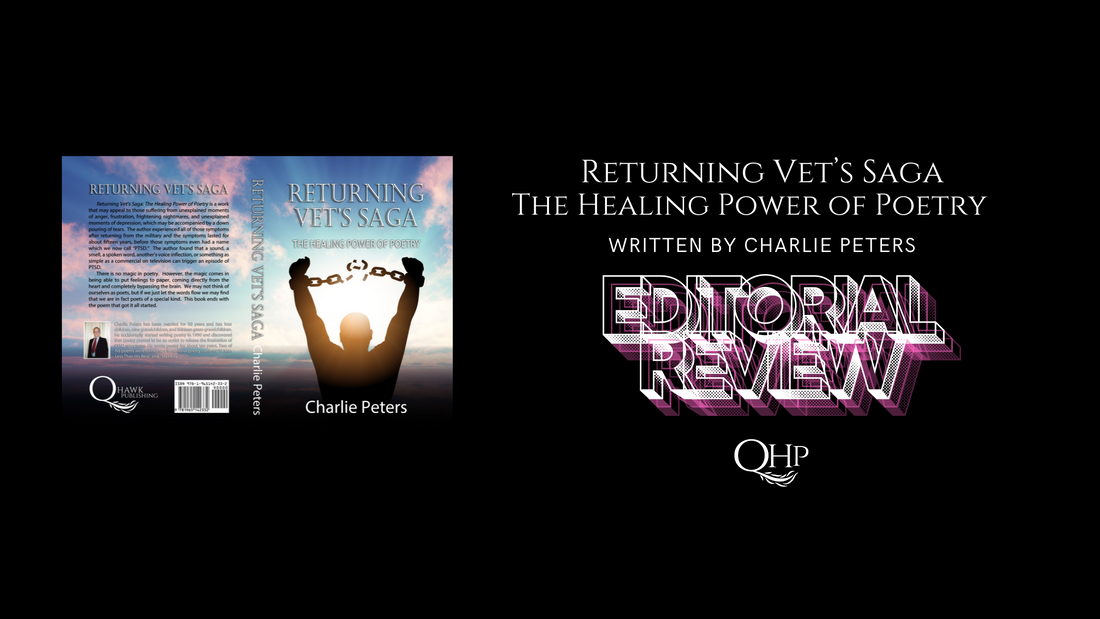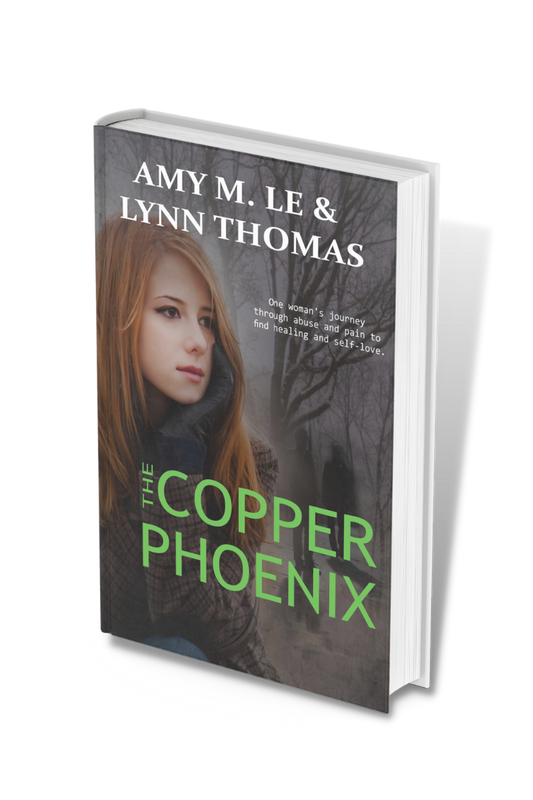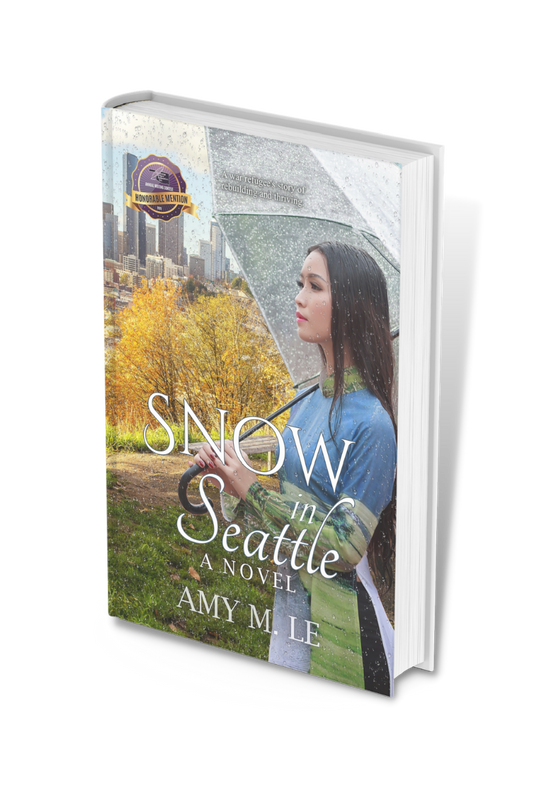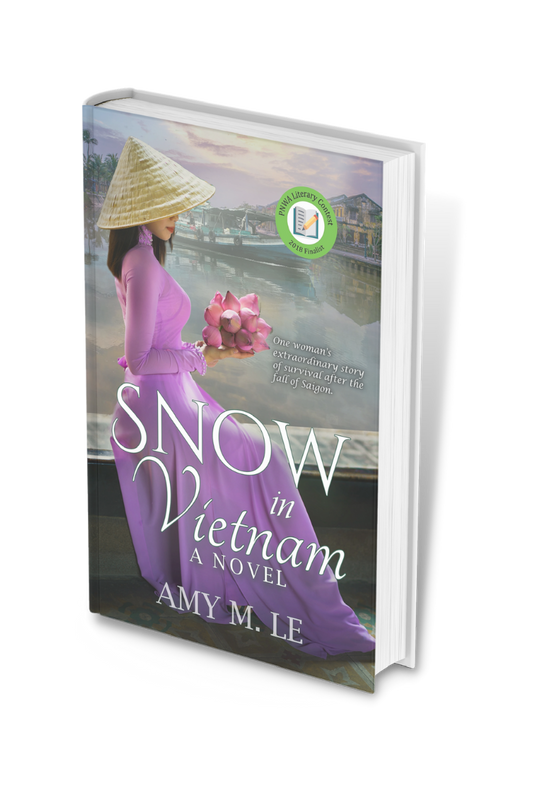Written by Charlie Peters
February 19, 2025
Review by Quill Hawk Publishing
Returning Vet’s Saga: The Healing Power of Poetry by Charlie Peters is a poignant collection that delves into the emotional aftermath of military service, mainly focusing on the challenges veterans face upon returning to civilian life. Drawing from his personal experiences during the Vietnam War, Peters offers a series of heartfelt poems that articulate the struggles of post-traumatic stress disorder (PTSD), including episodes of anger, frustration, nightmares, and unexpected bouts of depression. His work shows how seemingly innocuous triggers—a sound, a smell, a word—can evoke powerful memories and emotions. Through the therapeutic act of writing, Peters demonstrates how poetry can serve as a conduit for healing, allowing emotions to flow directly from the heart, bypassing the analytical mind. This collection not only honors those who have served but also provides solace and understanding to fellow veterans and their loved ones.
Charlie Peters’ Returning Vet’s Saga: The Healing Power of Poetry stands as a testament to the resilience of the human spirit in the face of the enduring scars of war. With unflinching honesty, Peters invites readers into the intimate recesses of a veteran’s psyche, offering a raw and authentic portrayal of life after combat. His poetry captures the nuanced interplay between haunting memories and the relentless pursuit of peace, providing a voice to emotions often left unspoken. Peters’ journey from a young draftee to a reflective poet underscores the transformative power of artistic expression to cope with trauma. This collection is a cathartic outlet for the author and a beacon of hope for veterans grappling with similar challenges.
Returning Vet’s Saga is a compelling read that fosters empathy and offers profound insights into the complexities of PTSD, making it an invaluable resource for veterans, their families, and anyone seeking to understand the lasting impacts of war.
Charlie Peters’ use of poetry as a therapeutic tool for processing PTSD aligns with a long tradition of veteran poets who have turned to verse to articulate the emotional toll of war. His work shares similarities with poets like Wilfred Owen, Brian Turner, and Yusef Komunyakaa but differs in style, scope, and thematic focus.
Wilfred Owen’s poetry is characterized by stark imagery and a critique of WWI’s brutality. While Owen’s work is more politically charged, highlighting the lies behind patriotic rhetoric, Peters’ poetry is more introspective, focusing on his journey of healing.
Yusef Komunyakaa employs rich sensory detail and jazz-like rhythms to capture Vietnam’s beauty and horror. Peters, also a Vietnam veteran, shares a similar thematic focus on memory and trauma, but his approach is more direct, often reading like personal reflections rather than complex, layered narratives.
Brian Turner’s work is known for its haunting lyricism and cinematic quality, often blurring the lines between beauty and violence from the Iraq War. Peters’ poetry, in contrast, is more straightforward and raw, using direct language to explore his emotional landscape.
Peters’ unique approach functions explicitly as therapy, focusing on emotional release and healing. Unlike some veteran poets who engage deeply with metaphor and experimental form, Peters’ work is more accessible, resembling journal-like reflections transformed into verse. He emphasizes the immediacy of emotion, capturing how PTSD manifests in daily life.
While poets like Owen, Komunyakaa, and Turner often balance artistic craft with more profound literary complexity, Peters prioritizes poetry as a tool for personal healing. His work stands out for its raw sincerity and direct engagement with the therapeutic process, making it an essential contribution to veteran literature, particularly for those seeking comfort and solidarity in their struggles with PTSD.
Charlie Peters employs several poetic techniques that enhance his storytelling and make his poetry a powerful medium for expressing the veteran experience. While his style is often direct and emotionally raw, he utilizes specific literary devices to deepen the impact of his work.
Peters often writes in free verse, which allows his poetry to feel natural and spontaneous, mirroring the unpredictability of memory and trauma. His conversational tone makes his poems feel intimate and immediate as if he is speaking directly to the reader or another veteran.
Peters uses repetition to mirror the cyclical nature of PTSD and recurring memories. Phrases, sounds, or images may return throughout a poem, reinforcing the inescapability of trauma and difficulty moving forward.
Using enjambment (when a sentence runs onto the following line without a pause), Peters captures the disjointed flow of memory and thought. He also uses fragmented lines to reflect disorientation, anxiety, or sudden emotional shifts, simulating the experience of PTSD.
Many of his poems contrast combat memories with mundane aspects of civilian life. This technique highlights the tension between past and present, emphasizing how war never truly leaves a veteran.
Unlike some poets who rely heavily on metaphor, Peters often avoids abstraction and writes in plain, unembellished language. This stark approach makes his poetry feel authentic—like a veteran speaking straight from the heart rather than crafting an elaborate artistic piece.
Peters’ use of these techniques makes his poetry powerful and accessible, especially for fellow veterans. His raw honesty, vivid imagery, and fragmented structure create a deeply immersive experience, allowing readers to feel the weight of his memories and emotions. His poetry is not just about storytelling but about reliving and processing trauma in real time.
In Charlie Peters’ collection, Returning Vet’s Saga: The Healing Power of Poetry, several poems exemplify the techniques that enhance his storytelling:
1. “Returning Vet’s Saga”: This titular poem he first wrote serves as the collection’s foundation. It encapsulates his raw emotions upon returning from military service, utilizing free verse and a conversational tone to convey his experiences authentically.
2. “A Man Less Than His Best”: Recognized as a runner-up in a national poetry contest, this poem delves into the internal struggles of a veteran striving to reconcile his past with his present. Peters employs vivid imagery and repetition to emphasize the recurring challenges faced during reintegration into civilian life.
3. “Stairway”: Another acclaimed piece, also a runner-up in a national contest, “Stairway” explores the metaphorical ascent from the depths of trauma toward healing. The poem’s structure mirrors the fragmented journey of recovery, with enjambment and juxtaposition highlighting the contrasts between moments of despair and hope.
These poems, among others in the collection, showcase Peters’ ability to translate profound personal experiences into compelling poetry, offering readers insight into the emotional landscape of veterans.
Charlie Peters skillfully balances personal storytelling with broader themes about the veteran experience by intertwining his emotions and struggles with universal truths that resonate with other veterans. He uses personal narrative as a gateway to shared experiences. Peters writes deeply personal poems about his struggles with PTSD, anger, grief, and reintegration into civilian life. However, his raw honesty and straightforward language make his poems relatable to other veterans, as many share similar emotional battles. For example, in “Returning Vet’s Saga,” his journey mirrors the collective struggles of countless soldiers who have returned home changed by war.
Through the juxtaposition of war and civilian life, Peters often contrasts combat memories with the realities of everyday life, highlighting the ongoing struggles of veterans trying to reintegrate. This contrast helps readers—especially non-veterans—understand how war lingers in the mind long after a soldier returns home.
Repetition and fragmentation reflect PTSD in that the recurring themes in his poems—like sleepless nights, intrusive thoughts, or a sense of alienation—echo the repetitive cycles of trauma experienced by many veterans. His use of enjambment and fragmented lines mirrors the way traumatic memories often resurface unexpectedly, reinforcing how PTSD affects not just him but an entire community of veterans.
Above all, Peters uses poetry as healing and advocacy. Beyond telling his own story, Peters emphasizes the healing power of poetry, showing that veterans can use writing to process emotions. His work serves as both a personal catharsis and a broader message of hope, encouraging other veterans to find their paths to healing.
Peters’ poetry begins with the personal but extends into the collective, making his work both profoundly intimate and widely impactful. By sharing his journey with unfiltered honesty, he ensures that his poems serve as personal reflections and a voice for all veterans grappling with the aftermath of war.

978-1-965142-32-5 Paperback / 978-1-965142-33-2 Hardback
6"x9" trim, 270 pages, published in the United States of America by Quill Hawk Publishing in Edmond, OK.
To purchase: https://www.amazon.com/Returning-Vets-Saga-Healing-Poetry/dp/196514232X







